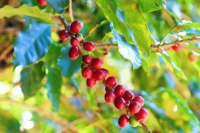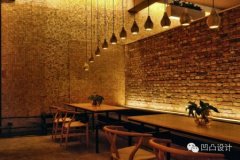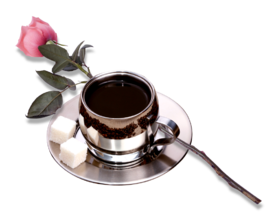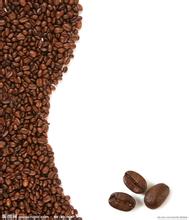480000 yuan Learn more about 480000 yuan
-
A Starbucks clerk in Hong Kong was sentenced to one and a half years' imprisonment for stealing 480000 yuan from himself for two years.

According to Hong Kong Ta Kung Pao, a staff member of a Starbucks coffee shop in Hong Kong went so far as to wear the bottom of a cabinet for two years, stealing an average of 20,000 yuan a month, defrauding the company a total of 480000 yuan. he pleaded guilty to theft in the district court yesterday and was sentenced to a year and a half in prison. The 28-year-old defendant Yang Weixiong, who worked in the Starbucks coffee shop under Meixin Group for many years, owed a debt of more than 100,000 yuan due to excessive profligacy.
2014-04-27 Hong Kong Star Buck shop assistant two years burglary 480000 yuan sentenced one and a half years Xiang -
The benefit of efficient and Water-saving Irrigation of Coffee in Mangjie Village, Menglian County, Yunnan Province

After the Mangjie coffee efficient water-saving irrigation demonstration project in Menglian County, Yunnan Province was completed and put into operation, it effectively covered an irrigated area of 800mu of coffee, increased fresh fruit output by 480000 kg, increased economic income by 960000 yuan, and increased average income per mu by 1200 yuan. It has effectively increased the income of the local people and is very popular. The project is located near Ma Lishu Village Group of Mangjie Village Committee in the north of Menglian County, 1.
2014-04-27 Yunnan Menglian County Mangjie Coffee High efficiency Water Saving Irrigation benefit Chu Xian Yunnan Province -
The franchisee did not return the capital during the cross-strait coffee franchise period and changed its name to operate.

The boss said: after five years without a return, the contract for joining the two sides of the strait had to be renamed as a lawyer, saying: if you don't change the soup, it may involve infringement. Five years ago, Mr. Zhao was introduced to the person in charge of cross-strait coffee and successfully joined. He opened a cross-strait coffee restaurant with an area of 600 square meters on Linping political and legal Street in Yuhang. One day three months ago, he went.
2014-04-27 Cross-strait coffee join during the period no return franchisee rename management boss open -
From 2012 to 2016, the development of the coffee industry ranked the top five coffee in the world as coffee consumption in China.

From 2012 to 2016, the coffee consumption market entered a period of rapid development. Coffee consumption in Chinese cities, the average annual coffee consumption per person is 4 cups, even in big cities such as Beijing and Shanghai, the annual consumption per person is only 20 cups. In Japan and Britain, each person drinks an average of one cup of coffee a day. Japan and Britain are both famous tea culture countries in the world.
2016-03-08 2012-2016 Coffee Industry Development Global Big five ranking medium -
56433 tons! Starbucks China for the first time disclosed the purchase and export of coffee beans in Yunnan

Professional coffee knowledge exchange more coffee bean information please follow the coffee workshop (Wechat official account cafe_style) more boutique coffee beans please add private Wechat Qianjie coffee, WeChat: qjcoffeex today, Starbucks China for the first time disclosed Yunnan coffee bean purchase, export and other data.
2022-12-21 -
Ethiopian Coffee Flavor description Grinding degree Taste characteristics Fine Coffee Manor introduction

This kind of coffee grows in areas ranging from 1400 to 2000 meters above sea level. After wet processing, this kind of coffee has a rich fragrance, a full fruit with moderate acidity and alkalinity, high quality and attractive spicy flavor. It is estimated that out of 49000 hectares of cultivated area, the average annual production of this coffee is 29000 tons (equivalent to 480000 bags of 60 kg coffee). Dejima (Djimma)
2016-09-30 Ethiopia coffee flavor description grinding taste characteristics boutique manor -
A brief introduction to the treatment method of grinding degree and baking degree of high-quality coffee beans in Xia Qisuo producing area

Limu Coffee this coffee grows in areas ranging from 1400 to 2000 meters above sea level. After wet processing, this kind of coffee has a rich fragrance, a full fruit with moderate acidity and alkalinity, high quality and attractive spicy flavor. It is estimated that out of 49000 hectares of cultivated area, the average annual production of this coffee is 29000 tons (equivalent to 480000 bags of 60 kg coffee).
2017-04-11 Unique thick Shaquiso producing area boutique coffee beans grinding roasting degree place -
Treatment method of grinding degree and baking degree of boutique coffee beans in aromatic Ethiopian coffee manor

Limu Coffee this coffee grows in areas ranging from 1400 to 2000 meters above sea level. After wet processing, this kind of coffee has a rich fragrance, a full fruit with moderate acidity and alkalinity, high quality and attractive spicy flavor. It is estimated that out of 49000 hectares of cultivated area, the average annual production of this coffee is 29000 tons (equivalent to 480000 bags of 60 kg coffee).
2017-04-29 Aromatic rich Ethiopia coffee manor boutique coffee beans grinding roasting -
Aromatic Ethiopian coffee growing environment Flavor Taste Introduction

Located in the most privileged natural conditions, Ethiopia produces unique high-quality coffee every year. Ethiopia's coffee growing cycle brings harvest joy to the country every year. Beautiful white coffee flowers bloom and bear fruit every year between March and April. Only the reddest and most mature fruits are selected between September and about December
2016-08-17 odor aroma richness ethiopia coffee cultivation environment region flavor -
Ethiopian Coffee Features Ethiopian Coffee Flavor Boutique Coffee

Ethiopian coffee beans grow in a near-natural environment. After years of cultivation under the same growing conditions, Ethiopian coffee beans have gradually adapted to the environment here. More than 60% of coffee beans are forest or semi-forest grown coffee. Coffee farming villages produce about 35 percent of the country's coffee. Many of these are used.
2016-07-27 Ethiopia Coffee Characteristics Flavor Boutique Coffee Bean Grown in -
Ethiopian coffee species Origin of Ethiopian coffee

Saifeng coffee beans grow in close to the natural environment, after years of planting under the same growth conditions, Ethiopian coffee beans have gradually adapted to the environment here. More than 60% of coffee beans are grown in forests or semi-forests. Large-scale coffee-growing villages account for about 35% of the country's total coffee production. These use multiple layers.
2016-05-27 Ethiopia coffee species origin Serbia Biya coffee beans growing in close to -
Introduction of Ethiopian Coffee Flavor and Fine Coffee

Ethiopian coffee beans grow in close to the natural environment, after years of planting under the same growth conditions, Ethiopian coffee beans have gradually adapted to the environment here. More than 60% of coffee beans are grown in forests or semi-forests. Large-scale coffee-growing villages account for about 35% of the country's total coffee production. Many of these are used.
2016-07-29 Ethiopia coffee producing area manor introduction flavor taste boutique -
Introduction to the growing environment of Ethiopian coffee

Ethiopian coffee beans grow in close to the natural environment, after years of planting under the same growth conditions, Ethiopian coffee beans have gradually adapted to the environment here. More than 60% of coffee beans are grown in forests or semi-forests. Large-scale coffee-growing villages account for about 35% of the country's total coffee production. Many of these are used.
2016-06-15 Ethiopia coffee growth environment introduction coffee beans grow in -
Introduction to the Flavor and Taste characteristics of Ethiopian Coffee Farm

Located in the most advantaged natural conditions, Ethiopia produces unique high-quality coffee every year. Ethiopia's coffee growing cycle brings the joy of harvest to the country every year. Beautiful white coffee flowers will bloom and bear fruit every year from March to April. Only the reddest and ripe fruits will be selected between September and December.
2017-02-24 Ethiopia coffee manor producing area flavor taste characteristics introduction variety -
Ethiopian Coffee Manor Flavor Taste introduces Ethiopian boutique coffee beans

Sustainable coffee culture Ethiopian coffee beans grow in close to the natural environment, after years of planting under the same growth conditions, Ethiopian coffee beans have gradually adapted to the environment here. More than 60% of coffee beans are grown in forests or semi-forests. The villages that grow coffee in large areas account for about the total amount of coffee produced in the country.
2016-08-04 Ethiopia coffee manor producing area flavor taste introduction boutique coffee beans -
Ethiopian Coffee Manor Flavor description Taste characteristics introduction of varieties in Grinding area

Large-scale coffee-growing villages account for about 35% of the country's total coffee production. These coffee farms, which use a multi-tier coffee planting system, are carefully cared for. Coffee farmers do not use chemical fertilizers, but use fallen leaves and animal and plant debris to increase soil nutrition. In addition to coffee, farmers also frequently grow non-coffee crops. It even accounts for the total amount of coffee in the country.
2016-10-07 Ethiopia Coffee Manor Flavor description palate characteristics Grinding producing area -
Description of Flavor of High-quality Coffee beans in Ethiopian Coffee Variety producing area

Ethiopia has a unique flavor that is different from other flavors and provides customers all over the world with a wide range of taste choices. In the highlands of southwestern Ethiopia, the Kaffa, Sheka, Gera, Limu and Yayu Senri coffee ecosystems are considered the hometown of Arabica coffee. this
2016-09-23 Ethiopia coffee variety producing area boutique coffee beans flavor description introduction -
Introduction to the taste treatment method of region flavor description of Ethiopian coffee manor brand

Ethiopian coffee farm brand flavor description taste treatment method introduces that Ethiopian coffee beans grow in a close to natural environment, after years of planting under the same growth conditions, Ethiopian coffee beans have gradually adapted to the environment here. More than 60% of coffee beans are grown in forests or semi-forests. A village house that grows coffee in a large area.
2016-11-25 Ethiopia Coffee Manor Brand region Flavor description taste processing -
Flavor and taste characteristics of Ethiopian coffee manor introduce Ethiopian coffee varieties

Ethiopian coffee beans grow in close to the natural environment, after years of planting under the same growth conditions, Ethiopian coffee beans have gradually adapted to the environment here. More than 60% of coffee beans are grown in forests or semi-forests. Large-scale coffee-growing villages account for about 35% of the country's total coffee production. Many of these are used.
2016-08-06 Ethiopia coffee manor producing area flavor taste characteristics introduction variety -
Introduction to the Fine Coffee Bean Flavor and Taste Manor in Ethiopia

Ethiopian coffee beans grow in close to the natural environment, after years of planting under the same growth conditions, Ethiopian coffee beans have gradually adapted to the environment here. More than 60% of coffee beans are grown in forests or semi-forests. Large-scale coffee-growing villages account for about 35% of the country's total coffee production. Many of these are used.
2016-07-14 Ethiopia boutique coffee beans flavor taste manor producing area introduction
